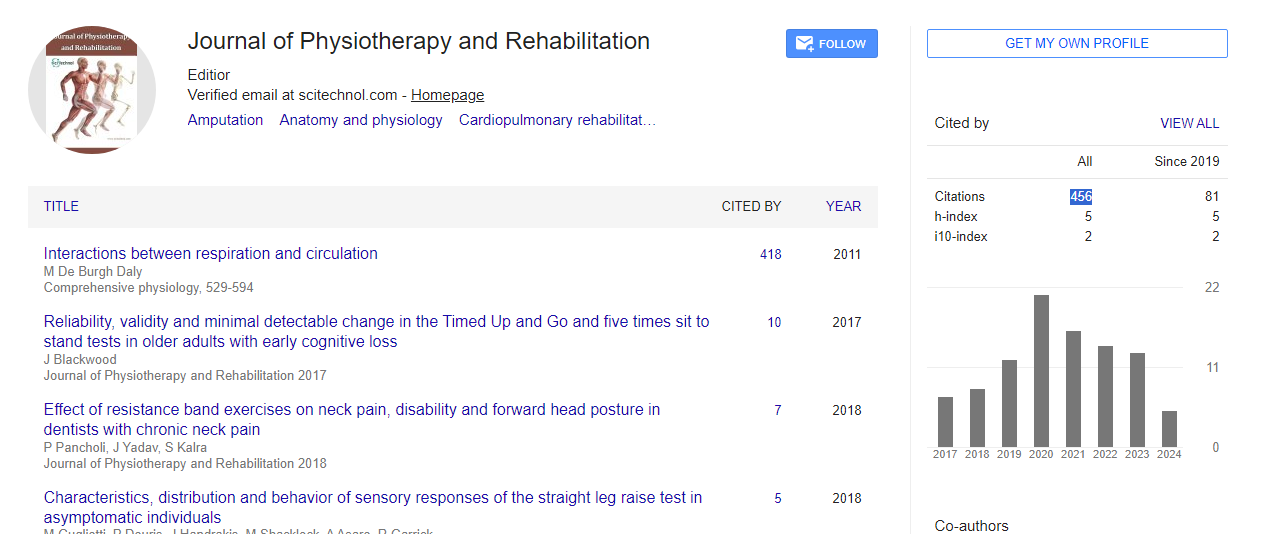Perspective, J Physiother Rehabi Vol: 8 Issue: 6
Role of Psychoneuroimmunology in Cancer Progression and the Potential of Psychotherapeutic Interventions to Enhance Immune Function
Sophie Dai*
1Department of Physical Therapy, Zhejiang University School of Medicine, Zhejiang, China
*Corresponding Author: Sophie Dai
Department of Physical Therapy, Zhejiang
University School of Medicine, Zhejiang, China
E-mail: daii@sophi@edu.cn
Received date: 23 November, 2024, Manuscript No. JPTR-24-155488;
Editor assigned date: 25 November, 2024, PreQC No. JPTR-24-155488 (PQ);
Reviewed date: 09 December, 2024, QC No. JPTR-24-155488;
Revised date: 17 December, 2024, Manuscript No. JPTR-24-155488 (R);
Published date: 24 December, 2024, DOI: 10.4172/JPTR.1000199.
Citation: Dai S (2024) Role of Psychoneuroimmunology in Cancer Progression and the Potential of Psychotherapeutic Interventions to Enhance Immune Function. J Physiother Rehabi 8:6.
Description
Psychoneuroimmunology (PNI) is an interdisciplinary field that explores the complex interactions between the mind, nervous system and immune system. Research in PNI has shown that psychological factors, such as stress and emotional happiness, can significantly influence immune function and contribute to the progression of various diseases, including cancer. Cancer, a disease characterized by uncontrolled cell growth and spread, can be influenced by both biological and psychological factors. In recent years, growing evidence has highlighted the role of PNI in understanding how emotional and psychological stress can impact cancer progression and the way psychotherapeutic interventions might help enhance immune function to improve patient outcomes. One of the primary ways that PNI research has linked psychological factors with cancer progression is through the impact of stress on the immune system. Chronic stress activates the body’s "fight or flight" response, which involves the release of stress hormones such as cortisol and adrenaline. While these hormones are essential for survival in acute stress situations, prolonged exposure to them can suppress immune function. Cortisol, for example, can reduce the activity of Natural Killer (NK) cells and T lymphocytes, which are essential for identifying and attacking cancer cells. Additionally, stress can increase inflammation in the body, which has been associated with the development and spread of various cancers. Chronic inflammation can create an environment that supports tumor growth and metastasis, further accelerating cancer progression.
Furthermore, stress and negative emotional states such as anxiety and depression can alter the balance of immune cells, leading to a weakened immune response that makes it more difficult for the body to fight cancer. Research has found that cancer patients with higher levels of psychological distress often have poorer outcomes, including more aggressive cancer progression, reduced survival rates, and a lower quality of life. These findings suggest that emotional happiness is closely linked to cancer outcomes and that addressing psychological factors may have therapeutic potential in cancer care.
Psychotherapeutic interventions, such as Cognitive Behavioral Therapy (CBT), Mindfulness Based Stress Reduction (MBSR) and other forms of psychological support, have shown promise in improving emotional happiness and enhancing immune function in cancer patients. These interventions are designed to reduce stress, promote relaxation and help individuals cope with the emotional challenges of living with cancer. The benefits of psychotherapeutic interventions extend beyond emotional relief; they can also have a direct impact on immune system function, potentially improving the body’s ability to fight cancer. Cognitive Behavioral Therapy (CBT) is one of the most well established psychotherapeutic approaches for managing stress and anxiety in cancer patients. CBT works by helping individuals identify and change negative thought patterns and behaviors that contribute to emotional distress. Through structured sessions, patients can learn effective coping strategies and gain a sense of control over their thoughts and emotions. By reducing anxiety and depression, CBT can help lower the levels of stress hormones like cortisol, which may enhance immune function and contribute to better cancer outcomes.
The biological mechanisms are fundamental the link between psychological interventions and immune function are still being explored, but there is strong evidence to suggest that psychotherapeutic approaches can help optimize immune responses. For example, studies have shown that relaxation techniques, such as deep breathing exercises, can reduce the production of stress hormones and decrease inflammation in the body. By addressing both the psychological and physiological aspects of cancer, these interventions help create a more favorable environment for immune cells to function effectively.
Conclusion
Psychoneuroimmunology offers valuable introduction into the complex relationship between the mind, immune system and cancer progression. Psychological factors, such as stress and emotional distress, can weaken the immune system and contribute to cancer development and metastasis. However, psychotherapeutic interventions such as CBT, MBSR and social support have the potential to enhance immune function by reducing stress, improving emotional happiness and development a healthier physiological environment. By integrating psychotherapeutic approaches into cancer care, healthcare providers can offer a more complete treatment plan that not only targets the physical aspects of cancer but also supports the mental and emotional health of patients, ultimately leading to better outcomes and improved quality of life.
 Spanish
Spanish  Chinese
Chinese  Russian
Russian  German
German  French
French  Japanese
Japanese  Portuguese
Portuguese  Hindi
Hindi 